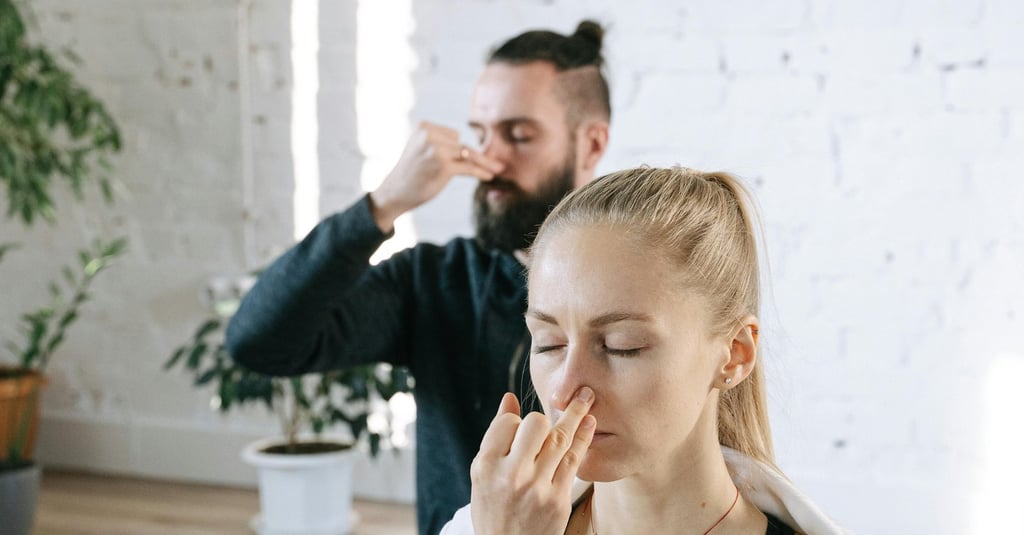Navigating Panic Attacks
Navigating panic attacks can seem overwhelming and even frighterning, but with the right tools and knowledge you can gain mastery over these intense episodes.
STRESS MANAGEMENT
Calen Rey
9/8/202410 min read


This post may contain affiliate links for which I may receive a commission from purchases made through the links
Panic attacks can be overwhelming and frightening experiences, often leaving individuals feeling helpless and out of control. However, with the right knowledge and tools, it's possible to manage and even prevent these intense episodes. In this article, we'll explore effective strategies to deal with panic attacks, empowering you to regain control and live a more peaceful life.
Key Takeaways
Panic attacks are intense episodes of anxiety that can be debilitating, but with the right strategies, they can be managed.
Understanding the causes and symptoms of panic attacks is the first step to developing effective coping mechanisms.
CBT THERAPY is a very hands on approach to stress and the results of stress. Learn effective coping skills, which build confidence, and eliminate self-doubt -- the most crucial part of treatment. These tools will help you become yourr own therapist and sustain recovery across a variety of issues, including:panic attacks and social anxiety.
Recognizing the signs of an impending panic attack can help you take proactive steps to mitigate the severity of the episode.
Incorporating breathing exercises, grounding techniques, and other self-care practices can be powerful tools in managing panic attacks.
EFT TECHNIQUE You can be among the thousands of people world-wide who've gotten themselves free from all kinds of pain and upset. When you learn and use EFT on a regular basis, you can improve your life more and more every single day.
Seeking professional help, such as therapy or medication management, can provide additional support for individuals struggling with panic attacks and anxiety disorders.
Understanding Panic Attacks
Panic attacks can be very distressing. They make people feel overwhelmed and powerless. We will look into what panic attacks are and their symptoms.
What are Panic Attacks?
A panic attack is a sudden, intense surge of symptoms. It's different from general anxiety, which lasts longer. Panic attacks are brief, lasting from a few minutes to an hour. They trigger the body's fight-or-flight response, causing physical and emotional reactions.
Common Symptoms of Panic Attacks
Panic attacks have both physical and psychological symptoms. Some common symptoms include:
Rapid heartbeat and palpitations
Shortness of breath or feeling like you can't breathe
Sweating, trembling, or shaking
Chest pain or discomfort
Dizziness, light headedness, or feeling faint
Nausea or stomach discomfort
Feelings of unreality or detachment from one's surroundings
Fear of losing control or going crazy
Overwhelming sense of anxiety or impending doom
These symptoms can be very intense. They often make people think they're having a medical emergency. Knowing what panic attacks are and their symptoms is key to coping.
Panic Attack SymptomsAnxiety Disorder SymptomsSudden onset, intense symptomsPersistent, low-level worry and nervousnessShort duration (minutes to an hour)Ongoing, can last for days or weeks Physical symptoms like rapid heartbeat, shortness of breathPsychological symptoms like excessive worry, irritabilityCan be triggered by specific situations or thoughtsPervasive, not necessarily linked to specific triggers
Understanding the difference between panic attacks and general anxiety helps. It lets people recognize and tackle their issues better.


Panic Attacks: Causes and Triggers
Panic attacks can be caused by many things, inside and outside of us. Knowing what can trigger them is key to handling them better and staying well.
Stress is a big one. It can be from work, personal life, or big life changes. Too much stress can make it hard for our bodies to handle anxiety, leading to panic attacks.
Some medical conditions can also lead to panic attacks. Things like thyroid issues, low blood sugar, or some medicines can upset our body's balance, making panic more likely.
Experiencing trauma, old or new, can also trigger panic attacks. Our minds react to threats, causing the symptoms of a panic attack.
Other things that might cause panic attacks include:
Caffeine or other stimulants
Not getting enough sleep or having irregular sleep
Phobias or specific fears
Hormonal changes, especially in women
Knowing what can lead to panic attacks helps us find our personal triggers. We can then work on strategies to deal with them better.
Potential Causes of Panic AttacksPotential Triggers of Panic AttacksStressTraumatic experiencesUnderlying medical conditionsCaffeine or stimulant intakeHormonal changesLack of sleepPhobias or specific fearsHormonal changes
Recognizing the Signs of an Impending Panic Attack
Knowing the early signs of a panic attack can change how you handle them. By listening to your body and mind, you can lessen the impact of a panic attack before it gets worse.
Physical and Emotional Cues
Panic attack warning signs often start with physical symptoms. You might feel your heart racing, have trouble breathing, sweat a lot, or shake. These signs can quickly turn into intense fear, feeling like you're losing control, or feeling detached from reality.
By paying attention to these signs, you can act early. This can help reduce the severity of the panic attack.
Identifying Your Personal Triggers
Think about past panic attacks to find common situations or things that trigger them for you.
Look at environmental factors like crowded places, certain locations, or people that often lead to panic attacks.
Notice any emotional stress or anxiety that might be causing your triggers.
Understanding your panic attack warning signs and triggers helps you manage anxiety. This knowledge is a key part of improving your mental health.






Coping Strategies for Panic Attacks
Dealing with a panic attack can be tough, but there are ways to take back control. Breathing exercises and grounding techniques can calm your mind and body. These strategies help during an episode.
Breathing Exercises
Deep, controlled breathing is key to managing panic. Try the 4-7-8 method: breathe in for 4 seconds, hold for 7, and breathe out for 8. This method can slow your heart and help you focus.
Grounding Techniques
Grounding exercises help you stay in the present moment. Look around and name 5 things you see, 4 things you feel, 3 things you hear, 2 things you smell, and 1 thing you taste. This keeps you grounded.
Grounding Mats
Grounding mats can provide some relief from stress. Often we can be so disconnected from the earth that stress naturally follows.
Self-soothing methods like squeezing a stress ball or listening to calming music can also help. It's important to have a variety of coping strategies ready. This way, you can quickly find what works best for you.


"Coping with panic attacks is about finding what works best for you. Don't be afraid to experiment with different techniques until you discover your personal panic-busting superpowers."
.Panic attacks are temporary, and the right strategies can help you get through them. By practicing these methods, you'll be ready for future episodes. This way, you can take back control of your mental and physical health.
Panic Attacks and Anxiety Disorders
Panic attacks often go hand in hand with anxiety disorders like generalized anxiety, social anxiety, or PTSD. It's key to grasp how these conditions are linked for the best treatment.
Anxiety disorders make people worry too much, fear, and feel anxious all the time. Panic attacks are a common symptom for those with these disorders. Knowing how panic attacks and anxiety disorders are connected is vital.
Generalized Anxiety Disorder and Panic Attacks
People with generalized anxiety disorder (GAD) often have panic attacks. These attacks can make their anxiety and stress worse. Panic attacks can make GAD symptoms even harder to deal with.
Social Anxiety and Panic Attacks
Social anxiety disorder, or social phobia, also links to panic attacks. The fear of being judged or embarrassed can cause intense panic. This fear can lead to avoiding social situations and feeling more isolated.
Post-Traumatic Stress Disorder and Panic Attacks
Panic attacks are common in people with PTSD. Traumatic events can make them feel always on edge and ready to panic. Treating PTSD is key to managing panic attacks.
Getting help is crucial for managing panic attacks and related mental health issues. Treatment might include therapy, medication, or both, depending on what works best for each person.
Anxiety DisorderPanic Attack CharacteristicsTreatment ApproachesGeneralized Anxiety Disorder (GAD)Recurrent, unpredictable panic attacks that exacerbate overall anxietyCognitive-Behavioral Therapy, Medication (e.g., antidepressants, anti-anxiety drugs)Social Anxiety DisorderPanic attacks triggered by fear of social situations and judgementExposure Therapy, Social Skills Training, Medication (e.g., selective serotonin reuptake inhibitors)Post-Traumatic Stress Disorder (PTSD)Panic attacks related to hypervigilance and trauma-related triggersTrauma-Focused Therapy, EMDR, Medication (e.g., antidepressants, anti-anxiety drugs)
Understanding the link between panic attacks and anxiety disorders helps people seek the right treatment. It also helps them find ways to cope with their mental health challenges.


Seeking Professional Help
If you're dealing with frequent or intense panic attacks, getting help from a professional can change your life. There are many mental health resources and therapy options to help you manage panic disorders.
Therapy Options
Cognitive-behavioral therapy (CBT) is often suggested for panic attacks. It helps you spot and change negative thoughts that lead to panic. You'll learn how to handle your symptoms better.
Exposure therapy is another good choice. It slowly gets you used to things that make you panic. This way, you face your fears and panic less often.
Medication Management
Healthcare experts might suggest medication for panic disorders. Antidepressants, anti-anxiety drugs, and beta-blockers can ease panic symptoms. But, it's important to work with a doctor to find the right medicine and amount.
Getting help for panic attacks gives you the tools and support to take back control of your mental health. By trying different therapy for panic disorders and medication for panic attacks, you can find a plan to manage your panic and feel better overall.
"Seeking professional help is a courageous first step towards managing panic attacks and regaining a sense of stability in one's life."
Self-Care and Lifestyle Changes
Creating a self-care routine and making lifestyle changes can help manage panic attacks. It's important to manage stress, adopt healthy habits, and use relaxation techniques every day.
Stress Management
Finding and dealing with stress is key to managing panic attacks. You can try mindfulness, exercise, or counseling to find ways to cope.
Healthy Habits
Healthy habits like a good diet, regular sleep, and less caffeine and alcohol can greatly improve your well-being. These changes can also help with panic attack symptoms.


Relaxation Techniques
Try deep breathing, progressive muscle relaxation, or meditation daily. These can calm your mind and body, making panic attacks less intense and frequent.
Do things that make you happy and relaxed, like reading, listening to music, or being in nature. These can distract you and improve your mood.
YOGA -AN ANCIENT STRESS REMEDY
Yoga can help you relax and unwind. The endorphins produced help your system to rebalance.
Self-Care StrategiesBenefitsStress ManagementReduces the impact of panic attack triggersHealthy HabitsImproves physical and emotional resilienceRelaxation TechniquesCalms the mind and body, decreasing panic attack severity
By focusing on self-care and making lifestyle changes, you can manage panic attacks better. This helps you feel more in control of your well-being.
"Self-care is not selfish - it's essential for your mental and physical health. Take the time to nurture yourself, and you'll be better equipped to handle panic attacks when they arise."
Panic Attacks and Their Impact on Daily Life
Panic attacks affect many parts of our lives, like work, relationships, and social events. It's important to understand these challenges. This helps us find ways to cope and move forward.
Workplace Challenges
Work can be tough for those with panic attacks. Symptoms like a fast heartbeat and shortness of breath make it hard to focus. These attacks can also cause people to miss work, leading to more time off.
Relationships and Social Situations
Panic attacks can hurt our personal and social lives. They make it hard to keep up with plans because you're worried about having an attack. This can lead to feeling alone and problems in relationships.
To deal with panic attacks, we need to be aware of our feelings and learn to manage stress. Getting support from family and mental health experts is key. By facing these challenges, we can take back control of our lives.
"Panic attacks can be debilitating, but with the right strategies and support, individuals can learn to manage them and reclaim their daily lives."
Conclusion
We've come to the end of our exploration of panic attacks. We've learned a lot about them, their causes, and how to deal with them. This knowledge helps us take charge of our mental health.
The main points from this article are crucial. They include recognizing panic attack signs, using breathing and grounding techniques, and getting professional help when needed. Managing panic attacks is a journey. With the right tools and support, you can find calm and confidence again.
Now, let's keep moving forward. Try out different strategies and find what works for you. Don't hesitate to ask for help from mental health experts. By focusing on your mental health and staying committed to recovery, you can overcome panic attacks. This will lead to a more fulfilling and balanced life.
FAQ
What are panic attacks?
Panic attacks are sudden and intense episodes of overwhelming anxiety and fear. They include physical symptoms like rapid heartbeat and trembling. People often feel like something terrible is about to happen.
What are the common symptoms of panic attacks?
Symptoms include rapid heartbeat, chest pain, and trouble breathing. You might sweat, tremble, or feel like you're choking. Nausea, dizziness, and feeling detached are also common.
What can cause or trigger panic attacks?
Many things can trigger panic attacks. Stress, mental health issues, and traumatic experiences are common causes. Certain situations or places can also trigger them.
How can I recognize the signs of an impending panic attack?
Look out for muscle tension, racing thoughts, and a sense of dread. These signs can signal an attack is coming. Knowing your triggers helps you prepare and manage attacks.
What are some effective coping strategies for panic attacks?
Deep breathing and grounding techniques are helpful. Focusing on your surroundings can calm you down. Calming activities and self-soothing methods also work well.
How are panic attacks related to anxiety disorders?
Panic attacks often go hand in hand with anxiety disorders. Conditions like generalized anxiety disorder or post-traumatic stress disorder can trigger them. Treating the underlying condition is key to managing panic attacks.
When should I seek professional help for panic attacks?
If panic attacks happen often and disrupt your life, seek help. Therapy or medication can help manage them effectively.
How can self-care and lifestyle changes help with panic attacks?
Stress management and healthy habits are important. Regular exercise, good sleep, and a balanced diet help. Relaxation methods also play a big role in managing panic attacks.
How can panic attacks impact daily life and relationships?
Panic attacks can make work and social life hard. They might lead to avoiding certain situations. Finding ways to cope with these challenges is essential. Often journaling can be very helpful.
